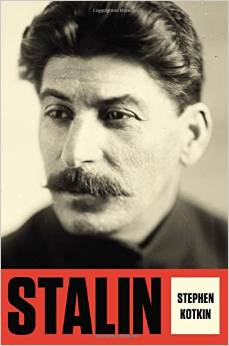 For Christmas my wife bought me Stephen Kotkin’s new biography of Ioseb Jughashvili, otherwise known to history as Joseph Stalin. It’s huge, so I’m nowhere near finished with it, but it has been an excellent read so far, full of tons of background history and information on everything from pre-WWI Europe to the reasons for (and nature of ) the Russian revolution. I guess you have to like history, but really, it’s great. Anyway, like all good books on history, it’s got lessons for our current times, and even more than that, it has food for thought for the Christian. For instance, in this passage, Kotkin discusses how unlikely it seems for someone from the edges of society to ascend to the top and into the center of a nation, from being a seemingly unimportant individual (a “no name”) to the most powerful person in a nation, or even in an era. And yet, it does happen. Kotkin writes:
For Christmas my wife bought me Stephen Kotkin’s new biography of Ioseb Jughashvili, otherwise known to history as Joseph Stalin. It’s huge, so I’m nowhere near finished with it, but it has been an excellent read so far, full of tons of background history and information on everything from pre-WWI Europe to the reasons for (and nature of ) the Russian revolution. I guess you have to like history, but really, it’s great. Anyway, like all good books on history, it’s got lessons for our current times, and even more than that, it has food for thought for the Christian. For instance, in this passage, Kotkin discusses how unlikely it seems for someone from the edges of society to ascend to the top and into the center of a nation, from being a seemingly unimportant individual (a “no name”) to the most powerful person in a nation, or even in an era. And yet, it does happen. Kotkin writes:
Stalin’s ascension to the top from an imperial periphery was uncommon but not unique.
Napoleone di Buonaparte had been born the second of eight children in 1769 on Corsica, a Mediterranean island annexed only the year before by France; that annexation (from the Republic of Genoa) allowed this young man of modest privilege to attend French military schools. Napoleon (in the French spelling) never lost his Corsican accent, yet he rose to become not only French general but, by age thirty-five, hereditary emperor of France.
Then plebeian Adolf Hitler was born entirely outside the country he would dominate: he hailed from the Habsburg borderlands, which had been left out of the 1871 German unification. In 1913 at age twenty-four, he relocated from Austria-Hungary to Munich, just in time; it turned out, to enlist in the imperial German army for the Great War. In 1923, Hitler was convicted of high treason for what came to be known as the Munich Beer Hall Putsch, but a German nationalist judge, ignoring the applicable law, refrained from deporting the non-German citizen. Two years later, Hitler surrendered his Austrian citizenship and became stateless. Only in 1932 did he acquire German citizenship, when he was naturalized on a pretext (nominally, appointed as a “land surveyor” in Braunschweig, a Nazi party electoral stronghold). The next year Hitler was named chancellor of Germany, on his way to becoming dictator.
By the standards of a Hitler or a Napoleon, Stalin grew up as an unambiguous subject of his empire, Russia, which had annexed most of Georgia fully seventy-seven years before his birth. Still, his leap from the lowly periphery was impossible.
Consider further that the young Jughashvili [Stalin’s last name by birth] could have died from smallpox, as did so many of his neighbors, or been carried off by the other fatal diseases that were endemic in the slums of Batum and Baku, where he agitated for socialist revolution. Competent police work could have had him sentenced to forced labor in a silver mine, where many a revolutionary met an early death. Jughashvili could have been hanged by the authorities in 1906-7 as part of the extrajudicial executions in the crackdown following the 1905 revolution (more than 1,100 were hanged in 1905-6)…
If Stalin had died in childhood or youth, that would not have stopped a world war, revolution, chaos, and likely some of authoritarianism redux in post-Romanov Russia. And yet the determination of this young man of humble origins to make something of himself, his cunning, his honing of organizational talents would help transform the entire structural landscape of the early Bolshevik revolution from 1917. Stalin brutally, artfully, indefatigably built a personal dictatorship within the Bolshevik dictatorship. Then he launched a saw through a bloody socialist remarking of the entire former empire, presided over a victory in the greatest war in human history, and took the Soviet Union to the epicenter of global affairs. More than for any other historical figure, even Gandhi or Churchill, a biography of Stalin, as we shall see, eventually comes to approximate a history of the world.
As I read this, it seemed to be a powerful illustration of that old cliché, “You never know who you’re talking to.” These very powerful (and powerfully terrible) men had moved through their youth as “normal” non-descript personalities. What if, at some early point in their life, someone had shared the gospel with them, and they had embraced it? It’s a good reminder–everyone we meet is important, and worth sharing with. First because they’re made in God’s image and God has sent his Son for them. And second, as this passage shows, because they will inevitably influence other lives, for good or evil. Even if it’s only friends and immediate family–how much impact does one mom or dad have on their kids? You start to realize how huge it is to influence someone for Christ. So many lives will be affected by each individual.
But how much more when we could be talking to someone who seems pretty normal, but who may one day end up in a position of power we couldn’t even imagine? History tells us this happens. When we take time to really lay out the gospel for that friend or stranger, could we be talking to someone who’s history may shape the history of the world? It’s possible!
